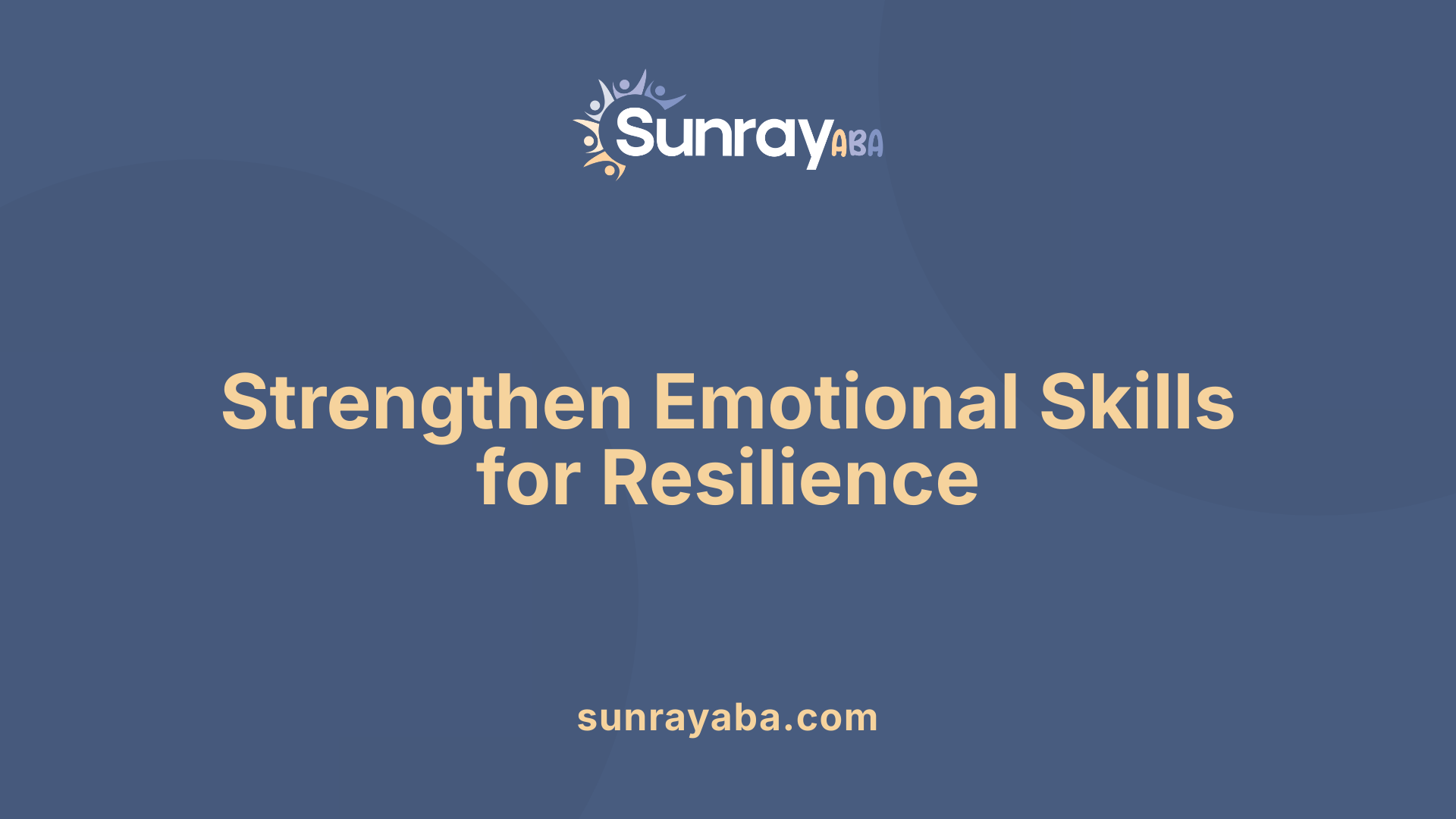Helping Kids Build Confidence In New Situations

Understanding the Foundations of Child Confidence
Building confidence in children, especially in new or challenging situations, is a crucial aspect of their overall development. It influences their resilience, social skills, and ability to navigate life's complexities. Parents and caregivers play a fundamental role by creating a nurturing environment that fosters trust, encourages independence, and promotes emotional growth. This article explores research-based strategies, practical activities, and communication techniques that help children develop self-assurance and resilience in unfamiliar settings.
Creating a Supportive Environment for Confidence Development

How can parents and caregivers help children build confidence?
Building confidence in children starts with creating a nurturing and positive environment where they feel valued and loved unconditionally. Caregivers play a vital role in fostering this sense of security by showing genuine affection through hugs, kind words, and spending quality time together. When children notice that their efforts are appreciated, especially when they try something new or difficult, it boosts their belief in their abilities.
Encouraging independence through simple, age-appropriate tasks—like choosing their clothes, helping with chores, or making decisions about play—helps children experience a sense of mastery. Praising their efforts specifically and highlighting their strengths, rather than just their achievements, reinforces their confidence and growth.
Support also involves helping children see mistakes as opportunities to learn rather than failures. By normalizing setbacks and emphasizing resilience, parents prepare their children to face challenges confidently. Engaging in active, positive interactions such as listening attentively, affirming their opinions, and showing consistent love further nurtures a secure sense of self-worth.
Overall, fostering a child’s confidence involves patience, kindness, and intentional support that emphasizes effort, resilience, and the unique qualities of each child.
What strategies can parents use to teach children how to cope with new or potentially scary experiences?
Helping children navigate unfamiliar or intimidating situations requires thoughtful preparation and reassurance. Parents can start by discussing upcoming experiences openly, explaining what to expect, and practicing scenarios in a calm, positive manner. Visiting new places together or role-playing activities beforehand can help children feel more in control and less overwhelmed.
Validating children's feelings is essential. Phrases like “It’s normal to feel nervous” or “You’re safe, and I’m here with you” reassure children that their emotions are understandable and acceptable. Teaching relaxation techniques such as deep breathing, counting, or visualization can give children tools to calm themselves when fears arise.
Establishing predictable routines and giving children choices within set boundaries foster independence and a sense of mastery. Praise for effort and courage, no matter the outcome, builds confidence over time.
If a child's anxiety significantly impacts daily life or hinders their development, seeking guidance from health professionals or mental health specialists is a wise step. They can provide tailored strategies and support to help children overcome fears and develop resilience.
Creating a safe, predictable environment where children feel supported helps them gradually build the confidence needed to explore new experiences and face challenges with optimism.
Additional insights on nurturing confidence
A comprehensive approach to fostering confidence involves a combination of emotional support, modeling positive behavior, and teaching practical skills. Modeling confidence oneself—such as trying new activities with enthusiasm—sets a powerful example for children.
Encouraging children to participate in community activities or volunteer work can promote a sense of purpose and belonging, further strengthening their belief in their abilities.
Building confidence is also about recognizing and celebrating small successes and helping children develop a growth mindset—an understanding that abilities can improve with effort. Creating a consistent pattern of successes and positive reinforcement motivates children to persist and try new things.
In conclusion, a nurturing environment characterized by unconditional love, routine, and confident role models forms the foundation for children to develop self-esteem and resilience. Through patient guidance and positive reinforcement, caregivers help children become confident, capable, and happy individuals.
| Aspect | Description | Practical Tips |
|---|---|---|
| Unconditional love | Provides secure attachment and self-worth | Show affection daily, listen actively, affirm their value |
| Routine and predictability | Reduces anxiety and builds trust | Maintain consistent schedules, prepare children for transitions |
| Modeled behavior | Demonstrates confidence and resilience | Share your experiences with overcoming challenges, try new things publicly |
| Effort-focused praise | Encourages perseverance | Compliment effort, not just results, celebrate persistence |
| Teaching coping skills | Builds resilience in scary situations | Practice deep breathing, role-play scenarios, discuss feelings |
Fostering confidence in children involves an integrated approach, emphasizing love, support, and opportunities to grow—laying the groundwork for a resilient and self-assured future.
Using Praise and Positive Reinforcement Effectively

How can parents and caregivers help children build confidence?
Building confidence in children is a fundamental goal for parents and caregivers. It begins with creating a nurturing environment where children feel valued and supported. Demonstrating unconditional love and expressing affection through hugs, kind words, and quality time lays a secure foundation. Engaging in activities that children enjoy and providing opportunities for them to succeed fosters a sense of achievement.
Encouraging independence is vital. Allowing children to make choices appropriate for their age, take on small responsibilities, and participate in decision-making helps develop their sense of competence. When children attempt new tasks, praising their efforts and progress—rather than just the outcome—motivates them to try again.
Providing honest feedback helps children understand their strengths and areas for growth. Recognizing and celebrating character traits like kindness, perseverance, and honesty boosts their self-esteem and encourages positive behavior. Teaching children to view mistakes as stepping stones to learning reduces fear of failure.
Positive interactions are essential. Active listening, affirming their opinions, and validating their feelings make children feel respected and understood. Consistently showing love and support reinforces their self-worth and confidence.
Involving children in problem-solving, supporting their passions, and encouraging resilience to setbacks prepare them to handle life's challenges more effectively.
What activities can help children develop self-confidence?
Various activities can foster a child's self-assurance and resilience. Engaging in team sports or physical activities promotes skill development, teamwork, and a sense of accomplishment. These activities teach children how to handle success and setbacks, building emotional resilience.
Role-playing and social scenario exercises give children the chance to rehearse handling different situations, enhancing their social confidence and emotional understanding. Creative pursuits like arts, music, or crafts allow children to express themselves and experience pride in their creations.
Setting and working toward personal goals, whether related to academics, hobbies, or personal interests, helps children recognize their progress and boosts their feeling of competence.
Activities that involve taking responsibilities, such as chores or helping others, foster a sense of contribution and independence. Supporting children in embracing mistakes as learning opportunities—by discussing setbacks and finding solutions—builds their resilience.
Self-reflection activities like gratitude journals or daily affirmations cultivate a positive self-image, emphasizing their strengths and progress. Encouraging children to practice positive self-talk counters negative thoughts and fosters a resilient mind-set.
By combining these activities with consistent praise that highlights effort and perseverance, caregivers can nurture enduring confidence and a healthy self-esteem in children.
Effective praise and reinforcement strategies for child confidence
Research-supported strategies for fostering confidence include focusing on effort rather than innate ability. Praising efforts, perseverance, and progress motivates children to keep trying, even when faced with difficulties.
Celebrating small achievements helps children experience success regularly, reinforcing their belief in their capabilities. Using specific, sincere praise—such as
Teaching Resilience and Emotional Skills in Children

How can caregivers support children in gaining confidence in unfamiliar or challenging situations?
Supporting children through new or difficult challenges is central to building their self-confidence. Caregivers can create a safe, trusting environment that encourages exploration and persistence. By gradually introducing children to unfamiliar experiences while providing reassurance, adults help children develop resilience and learn that they can overcome obstacles.
Encouragement and positive feedback are vital. When children succeed or even attempt something new, highlighting their effort rather than just the outcome reinforces their sense of capability. Building strong, loving relationships with attentive adults provides emotional security, making children more willing to try again after setbacks.
Engaging children in meaningful activities tailored to their interests fosters a sense of mastery and belonging. Practical strategies include role-playing to prepare for new situations, modeling calmness and confidence, and allowing safe risks. Reducing environmental stresses like loud noises or chaotic routines further enhances their ability to face challenges.
In addition, teachers and parents should promote independence by encouraging children to make choices, solve problems, and set personal goals. These experiences teach them that they can influence their world, nurturing resilience. Overall, gradually increasing exposure to challenges, combined with a foundation of love and support, equips children with the confidence and skills to approach new or difficult circumstances.
What resources are available for improving social and emotional learning to boost confidence?
Employing a variety of resources can significantly strengthen children’s social-emotional skills, which are closely linked to confidence and self-esteem. Organizations like CASEL offer comprehensive frameworks, curricula, and training programs that integrate social-emotional learning (SEL) into school environments. These resources include lesson plans, assessment tools, and teacher guides designed to foster self-awareness, empathy, self-regulation, and relationship skills.
For educators and families, accessible materials such as webinars, podcasts, and online guides provide practical strategies to support emotional development. Activities like reflection exercises, mindfulness practices, story-based learning, and conflict resolution exercises are effective in helping children understand and manage their feelings.
Classroom-based approaches, including group discussions, role-playing, and social problem-solving games, promote positive interactions and emotional resilience. Trauma-informed techniques ensure that children with adverse experiences receive sensitive support, facilitating trust and stability.
Technology tools are also available—from apps promoting mindfulness to digital stories addressing social-emotional skills—that help create engaging and safe learning environments.
Integrating these resources into daily routines and curricula aids children in building the confidence they need to navigate social settings, cope with setbacks, and pursue personal growth. Overall, a multi-faceted approach combining evidence-based programs and practical activities provides a sturdy foundation for developing confident, emotionally resilient children.
Building a foundation: How do initial childhood experiences affect confidence?
Early childhood experiences are fundamental in shaping a child’s sense of self-worth and confidence. Responsive caregiving, consisting of cuddles, reassurance, and attentive interactions, lays the groundwork for healthy self-esteem from birth. When babies feel loved and valued, they develop trust in themselves and their environment.
As children grow into toddlers and preschoolers, opportunities to explore their surroundings, make choices, and assert themselves foster independence and self-confidence. Balanced feedback that acknowledges effort and encourages trying, regardless of success, reinforces their sense of competence.
At school age, social and academic support, along with encouragement to develop new skills, enhances resilience and perseverance. Positive peer interactions and supportive family relationships strengthen their belief in their own worth.
Creating routines and consistent environments reduce anxiety, making children more willing to face new experiences. Celebrating small successes and helping children understand that mistakes are part of learning cultivates a growth mindset.
In sum, nurturing environments filled with love, stability, and encouragement support lifelong confidence, aiding children in facing future challenges with resilience and optimism.
How important are role models and daily interactions in boosting confidence?
Children learn a great deal from observing adults. Modeling confident behaviors—such as expressing feelings openly, persisting through difficulties, and demonstrating self-respect—gives children clear examples to imitate.
Everyday interactions, like showing enthusiasm for trying new tasks or calmly handling setbacks, contribute to children’s understanding of resilience and positivity. When adults treat setbacks as learning opportunities rather than failures, children are more likely to develop a growth mindset.
Involving children in chores, decision-making, and helping others fosters a sense of contribution and self-worth. Affirming their strengths and acknowledging their efforts regularly builds trust and encourages a healthy self-image.
Additionally, adults who demonstrate empathy, patience, and optimism create a safe space where children feel secure to express themselves. These role modeling and daily interactions are powerful tools that help children internalize positive attitudes about themselves and their abilities, laying the foundation for lasting confidence.
Encouraging Self-Expression and Growth Mindset

What phrases or activities can encourage children's confidence and self-assurance?
Using positive, affirming phrases is a simple yet powerful way to boost a child's confidence. Phrases like "I'm sure you can figure it out" or "One thing I know about you" acknowledge their strengths and encourage a growth mindset. These words help children believe in their ability to improve and solve problems.
In addition to language, activities that promote self-reflection can deepen a child's self-awareness. Creating affirmations together, journaling about their daily successes, or designing a keepsake memory box for achievements allows children to recognize their progress and feel proud of their efforts.
Involving children in setting and accomplishing small, manageable goals helps them experience success regularly. This builds their sense of competence and resilience. Celebrating effort rather than just results shows that trying and perseverance matter.
Supporting children through challenges with calm problem-solving and encouraging them to embrace mistakes as learning experiences further develops resilience. These approaches teach children that setbacks are part of growth, boosting their confidence to try new things.
Modeling self-confidence and creating a loving, unconditional environment provide a secure base where children feel safe to express themselves and explore. When children know they are valued just as they are, their emotional security is strengthened.
Together, these strategies—using positive phrases, engaging in reflective activities, emphasizing effort, and modeling confidence—lay a foundation for children to develop a resilient, positive self-view that will support their lifelong growth.
Building Motivation and Self-Belief in New Environments

What practical approaches can help children develop motivation and self-belief in new environments?
Supporting children as they navigate unfamiliar settings is essential for nurturing their confidence. One effective method is encouraging their independence by offering choices in daily activities. giving children the opportunity to make decisions fosters a sense of ownership and control, which enhances their motivation and belief in their abilities.
Celebrating small successes and efforts, rather than just final results, helps reinforce a growth mindset. Praising persistence and process encourages children to embrace challenges and view mistakes as learning opportunities. This approach promotes resilience and persistence in trying new things.
Focusing on character strengths and emphasizing effort rather than innate abilities develops a positive self-image. When children are acknowledged for their perseverance, kindness, or creativity, they build a stronger foundation of self-esteem.
In addition, involving children in activities that promote social interaction and learning helps establish a sense of belonging and purpose. Showing genuine interest in their passions and encouraging participation in group settings provides motivation and fosters social confidence.
Modeling positive attitudes, such as demonstrating patience and enthusiasm about trying new tasks, further influences children's outlook. When adults show confidence and resilience, children learn to imitate these behaviors, increasing their self-belief.
Creating a supportive environment involves providing positive, validating communication. Regularly encouraging children to take manageable risks and supporting them through setbacks motivate persistence.
Here's a summary of practical strategies:
| Strategy | Description | Impact |
|---|---|---|
| Autonomy Support | Giving choices and control over activities | Builds ownership and intrinsic motivation |
| Celebrating Effort | Acknowledging effort and small successes | Reinforces growth mindset and resilience |
| Character Focus | Praising qualities like kindness, perseverance | Strengthens self-esteem and moral development |
| Social Inclusion | Involving children in social and learning activities | Promotes belonging and social skills |
| Positive Modeling | Demonstrating confidence and persistence | Encourages similar behaviors in children |
In summary, fostering motivation and confidence involves a combination of supportive decision-making opportunities, recognition of effort, positively engaging in social experiences, and adults modeling resilience and optimism. These approaches guide children to develop a resilient self-belief that prepares them to thrive in new environments.
Fostering Confidence for Lifelong Success
Helping children build confidence, especially when faced with new or challenging situations, requires intentional effort and a nurturing approach. By creating a safe and loving environment, praising effort more than results, supporting emotional expression, and encouraging resilience through manageable risks and positive reinforcement, parents and caregivers set the stage for lifelong self-esteem. Utilizing research-backed strategies—such as modeling positive behavior, teaching problem-solving skills, and fostering social connections—can significantly enhance a child's ability to face new situations with confidence. Ultimately, nurturing a growth mindset and emphasizing personal strengths help children develop the resilience, motivation, and self-belief necessary for thriving in today’s complex world.
References
- 9 Ways to Boost Your Child's Self-Esteem | Nemours KidsHealth
- 25 Things You Can Do Right Now To Build a Child's Confidence
- Helping Kids Gain The Confidence To Try New Things
- Practical ways to raise confident kids - Mayo Clinic Health System
- Helping Your Highly Sensitive Child Gain Confidence
- Supercharging Self-esteem: How To Build Confidence In Children
- Self-Esteem and Mental Health | Guide For Parents | YoungMinds